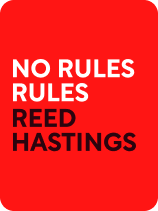

This article is an excerpt from the Shortform book guide to "No Rules Rules" by Reed Hastings. Shortform has the world's best summaries and analyses of books you should be reading.
Like this article? Sign up for a free trial here .
What are controls at work and what do they do? What are the effects of controls?
Controls are used to set rules for acceptable actions and fixed parameters for behavior. The effects of controls vary based on the workplace culture, but they can impede workflow and restrict capable staff necessarily.
Read on for more about the effects of controls and why Netflix removed controls.
The Effects of Controls and Their Removal
With a highly motivated staff and a culture of candor and accountability, Hastings was able to give his staff more freedom by removing controls.
Although giving employees so much freedom is unorthodox and can be risky, Hastings was confident that empowering his staff was in the company’s best interest. The effects of controls can be detrimental and removing them is workwhile in the right environment.
- He had cultivated a talented workforce and culture of candor that kept employees and managers accountable to each other.
- He discovered that when companies have policies and processes to control employees’ behavior, it makes people feel that their judgment is being undermined, which kills the creative atmosphere.
In order to safeguard against abuse, remove controls strategically to ensure that employees understand the weight of responsibility and the context to make good decisions. If done well, the effects of controls and their removal creates a culture in which freedom and responsibility spiral up: As employees enjoy more freedom, they act more responsibly, and as they act more responsibly, management can feel confident offering more freedom.
Eliminating Controls Improves Workflow
When managers entrust employees with making their own travel and expense decisions—even when this freedom is reigned in by context, safeguards, and transparency—the company’s costs are typically a little higher than they would be if the company had an approvals process. However, those costs are outweighed by the benefits of creating a low-rule environment. These benefits include:
- Flexibility: Without a restrictive approval process, employees have the flexibility to react, problem-solve, and make decisions under any circumstances. For example, when 4K resolution technology was new, Netflix partnered with Samsung to promote it: Samsung rolled out a 4K television, and Netflix filmed the newest season of its original series House of Cards in 4K. A tech product reviewer for The Washington Post agreed to test the new Samsung TV by watching House of Cards—which could give both companies a big publicity boost—but the night before, a junior Netflix employee discovered the TV was missing from the Netflix offices. He scrambled to find one for sale, but it was after hours and he couldn’t reach his boss to approve the $2,500 price tag. Empowered with the mandate to act in the best interest of the company, the employee bought the TV and averted a crisis—and the positive review in the Post was worth far more for Netflix than the cost of the last-minute purchase.
- Speed: As the previous example illustrates, employees often need to act quickly in order to perform their jobs well. Approvals processes slow down the workflow, and sometimes the window of opportunity for an important purchase closes by the time the company has signed off on it.
- Frugality: Paradoxically, employees often spend less when they’re told to use their judgment than when they’re given concrete spending limits. For example, if a company has a specific limit for how much employees can spend when they take clients out to dinner, the employees will be more likely to spend up to the limit, because they know they’re in the clear as long as they don’t go over the limit. By contrast, if employees are told to use their judgment, they’re likely to spend more conservatively, because they know they have to answer for their spending choices.
Exercise: The Effects of Controls on Your Work
Consider how approvals affect the way you work.
- Describe the most recent incident when you needed travel or expense approval.
- How much time did it take to get approval?
- If your purchase or travel plans were time sensitive (for example, an item had limited availability or your travel dates were soon), how did the approvals process affect your workflow?
- How would your workflow have been different without any approvals process?
- How would your purchases or travel reservations have been different if your only guideline was to act in the company’s best interest?
Exercise: How Do Controls Impact Your Staff’s Productivity?
Consider the effects of controls on your staff’s workflow.
- Briefly describe the travel and expense approval policies at your organization.
- Describe a recent incident when the policy created a conflict or a slowdown for one of your employees.
- How did that issue affect the employee’s work?
- If you considered removing approvals processes, what would your primary concern(s) be?
- How could you eliminate or minimize that concern?

———End of Preview———
Like what you just read? Read the rest of the world's best book summary and analysis of Reed Hastings's "No Rules Rules" at Shortform .
Here's what you'll find in our full No Rules Rules summary :
- How Netflix achieved massive success in a short period of time
- The unusual business practices that have helped Netflix sustain its success
- Why Netflix fires adequate employees






